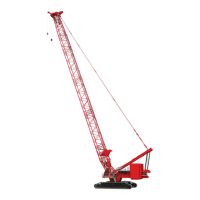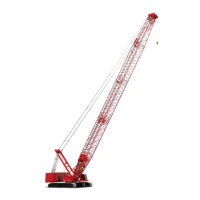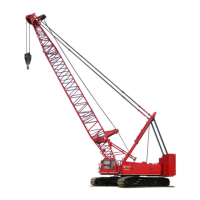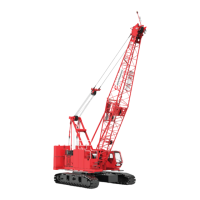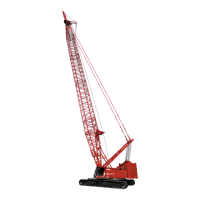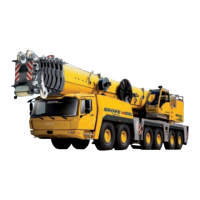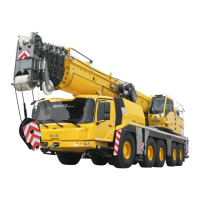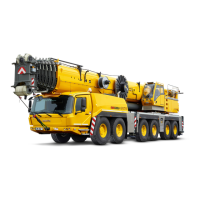ELECTRICAL SYSTEM MLC650 SERVICE/MAINTENANCE MANUAL
3-18
Published 09-09-16, Control # 229-09
Single contact limit switches are used for the following crane
functions:
• Lower boom point block-up limit
• Lower boom point block-up slow down
• Upper boom point block-up limit
• Upper boom point block-up slow down
• Luffing jib minimum angle
• Luffing jib maximum angle
• Left luffing jib cylinder stop position
• Right luffing jib cylinder stop position
• EUBP block-up limit 1 and 2
Solenoids
Solenoids are driven by controller digital outputs. The
solenoids activate and control the following cylinders, valves,
and pumps:
• Brake release cylinders
• Drum pawl cylinders
• Mast cylinders
• Cab tilt cylinders
• Self-assembly cylinder
• Cylinder stowage
• Rigging winch (drum 0)
• Diverter valves
• Jack cylinders
• Pin pusher cylinders
• Cooler fan pump
Angle Sensors
A controller provides power to the angle sensor. The sensor
produces an analog signal that is proportional to the sensor
angle. A controller analog input reads this signal, and the
controller software determines the mast angle based upon
the signal level.
Angle sensors are used to measure the following items:
• Live mast angle
• Fixed mast angle
• Boom angle
• Boom top angle
• Rotating bed pitch and roll
• VPC-MAX beam level
Alarms
A controller digital output drives the applicable alarm during
various operational states:
• Swing motion
• VPC motion
• Travel motion
• Load approaching or exceeding capacity
Load Pin Sensors
A controller digital output provides power to the load pin
sensors. A strain gauge within the load pin produces an
analog output current that is proportional to the load. A
controller analog input reads this output current, and the
controller software determines the value of the load based
upon the current level.
Load pin sensors monitor the following loads:
• Mast strap
• Right and left strap links
• Upper boom point/light fixed jib
Temperature Sensors
A controller digital output provides power to the temperature
sensor.
The sensor produces an analog voltage signal that is
proportional to temperature. A controller analog input reads
this voltage signal, and the controller software determines
the value of the load based upon the signal level.
Fuel Level Sensor
A controller digital output provides power to the fuel level
sensor. The fuel level sensor produces an ultrasonic pulse
that reflects off the fuel surface and bottom of the fuel tank.
A micro-controller in the fuel level sensor uses the echo-
return time to calculate the distance from the fuel surface to
the bottom of the tank. It then converts this information to an
analog voltage signal that is proportional to the fuel level and
sends the voltage signal to a controller analog input.
Hydraulic Fluid Level Sensor
A controller digital output provides power to the hydraulic
level sensor. The sensor has a capacitive probe that is
immersed in the hydraulic fluid. The level of hydraulic fluid
determines the capacitance of the probe.
A micro-controller in the probe converts the detected
capacitance to an analog voltage signal that is proportional
to the fluid level. The sensor then sends the voltage signal to
a controller analog input.

